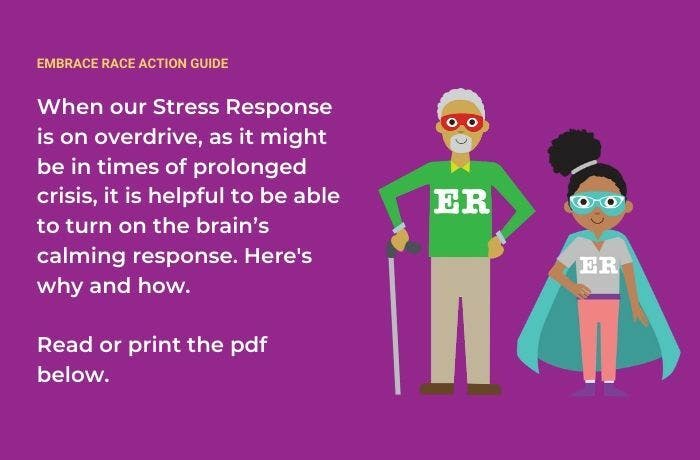Evidence-based suggestions for Managing Stress
by Adiaha Spinks-Franklin, MD, MPH, FAAP

As the worldwide pandemic caused by Coronavirus Disease 2019 (COVID-19) continues to unfold, it is important that each of us find ways to calm ourselves and manage the associated stress. This, too, shall pass. We don’t know when, but it will pass.Our three main reactions to stress are “fight” (e.g., hitting, arguing, throwing a tantrum), “flight” (e.g., walking or running away), and “freeze” (e.g., shutting down, not responding). Activating the Stress Response shuts down areas of the brain responsible for thinking clearly, solving problems, concentrating on a task, learning, memory, and impulse control. Under stress, it is completely normal that we might find it difficult to focus on completing assignments, learn something new, or recall what we have learned in the past. When our Stress Response is on overdrive, as it might be in times of prolonged crisis, it is helpful to be able to turn on the brain’s calming response.
1. Deep breathing exercises.
Deep breathing exercises help to “trick” the brain into thinking that everything is A-okay. Deep breathing exercises cause the brainstem to slow down our heart rate and turn off the fight-flight-freeze response. These exercises work best when we practice them daily. That way, when a stressful event occurs, our brains will automatically know how to calm ourselves. Here are two examples of deep breathing exercises:
- Box Breathing: Inhale for a count of 4, hold your breath for a count of 4, exhale for a count of 4. Repeat 5 times.
- 4-7-8 Breathing: Inhale for a count of 4, hold your break for a count of 7, slowly exhale for a count of 8. Repeat 5 times.
2. Gratitude Journaling.
Writing down what one is thankful for can help train our brains to focus on the positive and has been found to reduce symptoms of anxiety, stress, and depression. Here’s one way to “gratitude journal.”
- Get an unused notebook and set a time aside for writing in the journal every day at the same time (e.g., before bedtime).
- Write down three things you are thankful for that day (e.g., my favorite shirt was clean; I turned in all my homework on time; I didn’t argue with my sibling; I saw a butterfly).
3. Meditation.
Meditation is the process of taking quiet time to reflect on pleasant thoughts by focusing on the present moment (Mindfulness Meditation) or concentrating on a thought (Concentration Meditation). Meditation has delivered mental, physical, and spiritual health benefits to its practitioners for millennia, and can take many forms (e.g., prayer, movement, stillness). Meditation has been found to lower anxiety symptoms, reduce pain, and improve concentration
4. Yoga.
Yoga is a system of establishing body awareness, self-control and inner calm. Yoga has been used for millennia for physical, mental and spiritual well-being. Yoga consists of a combination of controlled breathing, meditative thinking and body stretches. Yoga practice can reduce symptoms of anxiety and stress.
For more evidence-based information about self-calming techniques for children and youth, I suggest the article Just Breathe: The Importance of Meditation Breaks for Kids from Healthy Children (www.healthychildren.org).
For more from Dr. Adiaha, also check out EmbraceRace’s webinar, Supporting children in the struggle against COVID-19.

Adiaha Spinks-Franklin
Get Insights In your Inbox
Join the EmbraceRace community! You will receive the newsletter with our latest on race & kids, including upcoming events and opportunities, resources, community news and curated links.
Subscribe


